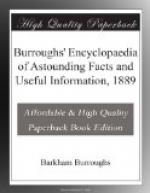PIECING, ETC.
Counterfeiters sometimes make ten bills of nine by what is termed piecing. Thus, a counterfeit note is cut into ten pieces by the counterfeiter, and these pieces are used in piecing nine genuine bills, from each of which a piece has been cut. The nine genuine pieces, thus obtained, are then pasted together, and with the tenth counterfeit piece added, make a tenth bill, which is the gain.
Piecing bank-bills is not a very successful practice. One who possesses such information as here given, can readily detect the difference between the counterfeit and the genuine. This difference is, however, made less apparent by the counterfeiter, who defaces the counterfeit part, so as to give the note a worn appearance. Counterfeiting is rendered very difficult in consequence of the remarkable excellence of the work on the government and national currency, as also from the difficulty of imitating the green. But this currency, if successfully imitated by counterfeiters, will repay large outlay and care, as the greenbacks pass anywhere in the nation, and a counterfeit may be carried to other states or sections as it becomes known in any particular locality. National bank currency may be counterfeited by preparing a plate, and then with simple change in the name of the bank the counterfeit can be adapted to the various towns where banks are located. This much is written, not to lessen the value of or confidence in the issues of the government, but to admonish the public against the dangers of a false security.
[Illustration]
* * * * *
[Illustration: HOW TO ADVERTISE]
HOW TO ADVERTISE
EMBRACING RULES, SUGGESTIONS, AND PRACTICAL HINTS ON THIS IMPORTANT SUBJECT.
[Illustration]
Volumes might be written on the necessity of, and the various methods employed for, advertising. Many prosperous men owe their success in life to judicious and liberal advertising. In this age of strong competition in the various avenues of trade, he who does not advertise his wares will probably be outdone by a more ambitious dealer, with perhaps a poorer article, who advertises liberally. People go where they are invited, and the merchant who advertises freely, places his store and windows in attractive order, and leaves the door open, will do far more business than he who does not cater to the public, is indifferent about appearances, gruff, and complaining of hard times.
Horace Greeley laid it down as a rule that a merchant should advertise equal to his rent. This, like all good rules, ought to have exceptions. An old and well established business would not require so much, while a new enterprise would require more than this amount expended judiciously in advertising. The merchant should decide at the beginning of the year about, what amount he may expend in advertising during the year, and then endeavor to place that amount in the best possible manner before the public.




